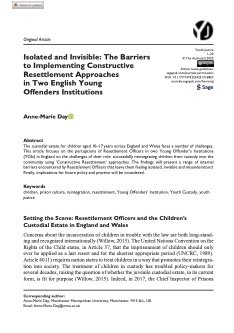By The Children and Young People’s Centre for Justice
There have been significant changes in recent years to children and young people’s experiences of Scotland’s care and justice systems, building on the historic legacy of the 1964 Kilbrandon Report. Notably, no longer will an under 18 be detained in a Young Offender Institution (YOI) in Scotland, and all policy and practice must now conform to the United Nations Convention on the Rights of the Child (UNCRC). However, despite this and other areas of progress, there is still much more to be done to end the continued overcriminalisation of children and young people in Scotland. Research has identified that these are overwhelmingly children from disadvantaged backgrounds, many of whom have suffered adverse childhood experiences (SCRA, 2022). Evidence has also shown the significantly detrimental impact on children and young people, both in the immediate and long-term, of being detained, from re-traumatisation to curtailing life opportunities and increasing chances of reoffending (McAra & McVie, 2022). We at the Children and Young People Centre for Justice (CYCJ) believe this can and should be changed, and that creating a more rights-respecting, trauma-informed approach will support all children and young people who come into contact with the care and justice systems, including victims, and will create safer communities. Drawing from our participatory work with children and young people with care and justice experience, our research evidence and policy and practice knowledge, we have identified three key ambitions for Scotland: 1. Keep children out of police cells 2. Provide community alternatives to secure care 3. Raise the age of criminal responsibility Within these three areas, we have identified nine actions which can be taken in this Parliament session and the next, to end the overcriminalisation of children and young people in Scotland: • Deliver the Places of Safety model through legislative change • Use all available resources to create Places of Safety • Extend the Whole System Approach to 26 • Provide greater support for youth work and youth services • Recognise and respond to Criminal Exploitation of Children • Deliver the Reimagining Secure Care report • End the inequity of use of Home Detention Curfews • Enable 18 year olds, where required, to remain in secure care in place of a YOI • Produce a roadmap for raising the age of criminal responsibility
Glasgow: Children and Young People’s Centre for Justice , 2025. 8p.




